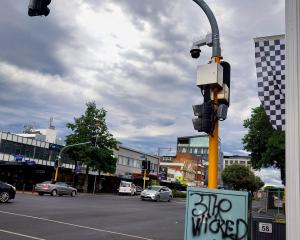
A Z-Energy spokesperson said a staff member became suspicious after a customer requested multiple high-value vouchers over several transactions.
After checking with the customer, they told the staff member the purchases were requested by their bank over the phone.
Z Dee St owner Jonathan Usher said he commended the employee for their actions and emphasised the importance of staff using their judgement in situations like these.
"While the circumstances themselves are unfortunate, we are extremely proud to see this staff member support a vulnerable customer, and ensure they reported the matter to the appropriate authorities."
Aged Concern hosted a cyber-crime awareness seminar last week with online Citizen21 cybersafety and risk assessment security expert John Parsons sharing his expertise.
The common scam involving the customer at the petrol station involves phone callers claiming to be someone from an organisation such as a bank or tax department demanding payment in forms of a Prezzy Card (pre-paid credit card), he said.
"But anyone online that you talked to asking you for a Prezzy Card ... it is a scam 100%."
Mr Parsons warned although cyber-crime occurred in the digital world, it was just as devastating as physical crime — leaving victims in emotional distress.
Seniors were frequent targets of more sophisticated forms of crime because "they are considered asset-rich and isolated" and the internet was "target-rich and offender-friendly".
Mr Parsons urged people to pay attention to behaviours rather than focusing on the relationship they had with someone — if they were giving money to someone or struggling to meet their own needs because they were financially supporting another person, it was a red flag that something was wrong.
"You have a duty of care for yourself first."
He also emphasised the growing problem of identity theft. Caution was needed with information given over the phone — removing labels from prescription containers and shredding documents before discarding them were ways to protect identity.
People or emails asking for passwords, credit card, passport numbers or other private details were tricks to deceive, Mr Parsons said.
"All these bits of information separately don’t cause much of a problem but when you put them all together, they can be used to commit identitytheft.
"Do not interact with emails from the IRD that claim you have a refund — it’s a scam.
"The emails can look very believable ... but they want your passwords or details and you’ve got a form to fill in — don’t do that."
Use phone numbers listed on a bank or organisation’s website — not the supplied one or supplied links.
Other red flags to watch for were messages from an unknown number who claimed to be "family" in financial distress, he said.
The goal of the cold call where the caller informs them a computer is infected with a virus to gain remote access was to steal personal data.
"The golden rule is: do not speak — hang up ... record the date and time and talk to your telephone provider if it keeps happening."
Mr Parsons warned a fake courier email notification that asked for credit card payment before delivery could happen was another scam.
"Don’t interact with the email or follow the instructions.
"Never send or give money to someone without talking to a trusted adult."
Readers who believe they have been or are being targeted by criminals could contact the New Zealand Police, Citizen’s Advice, Southland Community Law Centre or Age Concern.
For more information about cybercrime go to cert.govt.nz
- By Toni McDonald












